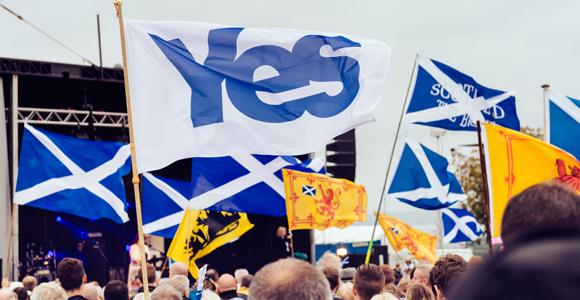What Would Scottish Independence Mean for Aviation?


The result of Scotland’s independence vote could create lower airfares for European flyers, change border setups and result in the establishment of a new flag carrier.
As the world watches the vote for Scottish independence, experts are weighing in on how the potential secession from the U.K. could affect air travel. While lower taxes and tariffs on airfare are promised, many are not predicting that a Scottish national airline would launch soon after independence.
One economic report released about the situation suggests that airlines could have an immediate boost if Scotland votes for independence. According to The Daily Record, a Barclays report suggests that Britain’s main airlines — British Airways, easyJet and Ryanair — would instantly benefit from the promise of reducing Air Passenger Duty (APD).
The International Business Times reports that, should Scotland become an independent nation, the Scottish National Party would cut APD on flights to the new country. Currently, travelers flying out of the U.K. are paying between $21 and $307 in taxes, depending on the booking class and distance flown. According to the International Business Times, easyJet and several other British-based airlines signed a joint statement in 2013 opposing the high airfare taxes.
As a result, experts suggest that more travelers would elect to fly from Scottish-based airports, due to lower flight costs. “Customers are very mobile,” Graeme Mason, planning director for Newcastle Airport (NCL), told the BBC. “They’ll shop around for the cheapest flight and they’ll travel quite long distances to get those flights.”
However, access to those potentially lower airfares could become more difficult based on international regulations. Scottish officials have said that if the country does become independent, they intend to stay in the British Common Travel Area (CTA) and retain their EU membership. According to The Telegraph, an independent Scotland could be forced to adopt the EU’s Schengen Area policy, which would require the installation of border checks, creating complications to the CTA agreement and adding additional delays to entering the new nation.
Would a new Scottish flag carrier take flight with the independent country? Many aviation executives have suggested that Scotland would not need its own carrier and could do well without one. Aviation consultant John Strickland told The Independent that while the idea of having a flag carrier may bolster national pride, “easyJet and Ryanair put a lot of activity into Scotland and they are best in class.”
Earlier this year, easyJet announced to the BBC that is was adding routes from Scotland starting in the fall, and the carrier has since announced plans to The Independent to operate “the largest network to and from Scotland.”
Ryanair executives have made multiple comments in support of Scottish independence. “We’ll continue to fly our way to Scotland, and bring our way into Scotland and bring people into Scotland, regardless of what currency they have up there,” CEO Michael O’Leary told BBC Radio Scotland.
British Airways CEO Willie Walsh addressed the idea of Scottish independence in February, telling BBC Breakfast that “If anything, [Scottish independence] might be marginally positive because I suspect the Scottish government will abolish air passenger duty, because they recognize the huge impact that that tax has on their economy.” Walsh added that Scotland’s independence could be a “positive development” for British Airways and that the carrier would continue flying into the country regardless.
Voting booths have closed and results are expected Friday morning.
[Photo: iStock]





















